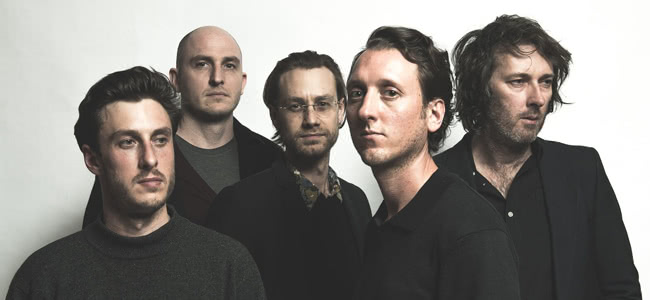It’s been five years since Perth alt-rockers The Panics released their last album, but they’re back today with their fifth record Hole In Your Pocket, compiling half a decade of personal experience into a fistful of fresh tracks.
“When I was first discovering music it was in that weekend world where there was nothing around, no place to go, so we’d go to the gravel and light the fire or we’d go to the carpark and people would skate, smoke pot, get drunk and make out. It’s always stayed with me, and it pops up from time to time.”
Hole In Your Pocket is out today and, while they’ve have had to reschedule the remainder of their national tour, you can still catch The Panics playing at Melbourne’s Howler on Saturday October 15, on sale now.

Weatherman
It started as a kind of folk song and slowly merged into this pulsing synth monster. One of the first tracks written for the record, it set a good precedent for the rest. It touches on climate and personal problems and says: you’ve been warned and you’ve had the chance to change, so it’s now or never to make this work.
Hole in Your Pocket
I’d been to the Pilbara region of WA a few times during the writing of the album and found it inspiring for a number of songs. The song comes out of looking at the centre of the WA mining boom through the eyes of my tourist self, taking in the extremes of the area for the first time and putting myself in the shoes of some of the local people who have watched and felt the rapid changes of the area.
To go to the Pilbara and in particular the Roebourne area is to see the extremes of huge wealth being generated in front of your eyes surrounded by pockets of poverty.all this amazing natural beauty with the machinery of the boom digging around it. trains of ore queued up to the port where a queue of ships await into the distance.
I wrote the song in Roebourne next to the dry dammed up river and wrote the song thinking of history you can’t take from people, rich man’s privileges and how he can do what he likes while the wreckage of his exploits are scattered over someone else backyard- it deals with identity and place and respecting others dignity and point of view.
Passenger Side
One of a couple of songs on the record that pull imagery out of my teenage years and the hills of Perth where I grew up. It’s all cars, gravel roads, older kids and strange rumours.
Carparks of Greschen
This came together refreshingly quick at the kitchen table and the band nailed it really well. it goes hand in hand in hand with the previous song ‘Passenger Side’ – both drawing from an outer Perth suburb world of my youth. The band formed in this atmosphere and it’s stuck with me to be a backdrop in a bunch of songs.
In the track I’ve taken a few characters and places from the time and given them a song – it’s kind of an ode to the nights lost hanging out at the car park learning how to get by. The song also sounds a lot like some of the music that would’ve been playing on the car radios at the time which I like a lot.
Not Apart, Not Together
This came together in the bands shed in Fitzroy. I’d written the words and chords in one quick sitting and then the band were jamming this great uplifting vibe on it. It reminded me a bit of Happy Mondays, bit Crowded House. It’s all about the compromises in relationships and the importance of being honest with ourselves.
The Birds
I thought of the ocean as a refuge and people being drawn to the elements in times of need. Writing the song, I imagined a young chap going through family struggles and taking energy from the ocean. He would watch the birds fly above him and imagine and feel their freedom.
The song switches between the boy and the view from up high as the bird looks down noticing the figure of the boy being swallowed up by the ocean, perhaps becoming it, perhaps dying perhaps flying underwater, being born again as a bird.
Know My Name
I really love this track. it’s about an actor past her prime but still holding strong to her dreams. I imagined a Hollywood waitress, sick of the game but resigned to it and just getting on with life. I really like the line before the chorus “there’s the stage door, and the kitchen door, and I always walk through em the same”.
Loiter With Intent
Another song I took out of travels to the WA northwest. I got the initial idea from the story of a local man who was picked up by police for “Loitering with Intent”, left in a police car to die while the police went in the pub.
It’s not a finger pointing song, its more trying to understand another man’s way of life and not judging him because of your differences. The band were in good form and I got to get into the electric guitar for a rare shot at the lead. You can hear we got on a bit of an early Tom Petty binge while making it.
Switching Off
There’s a bit of the White Album, a bit of Bacharach going on too. probably the most dramatic song on the record. It’s about all the different situations we find ourselves in where we have the story we tell ourselves and the people around us, and the truth we actually know in our hearts.
The chorus repeats “what’s really going on?” I like it a lot because it’s kind of like cutting through the bullshit and asking “what are you actually trying to say”?




































